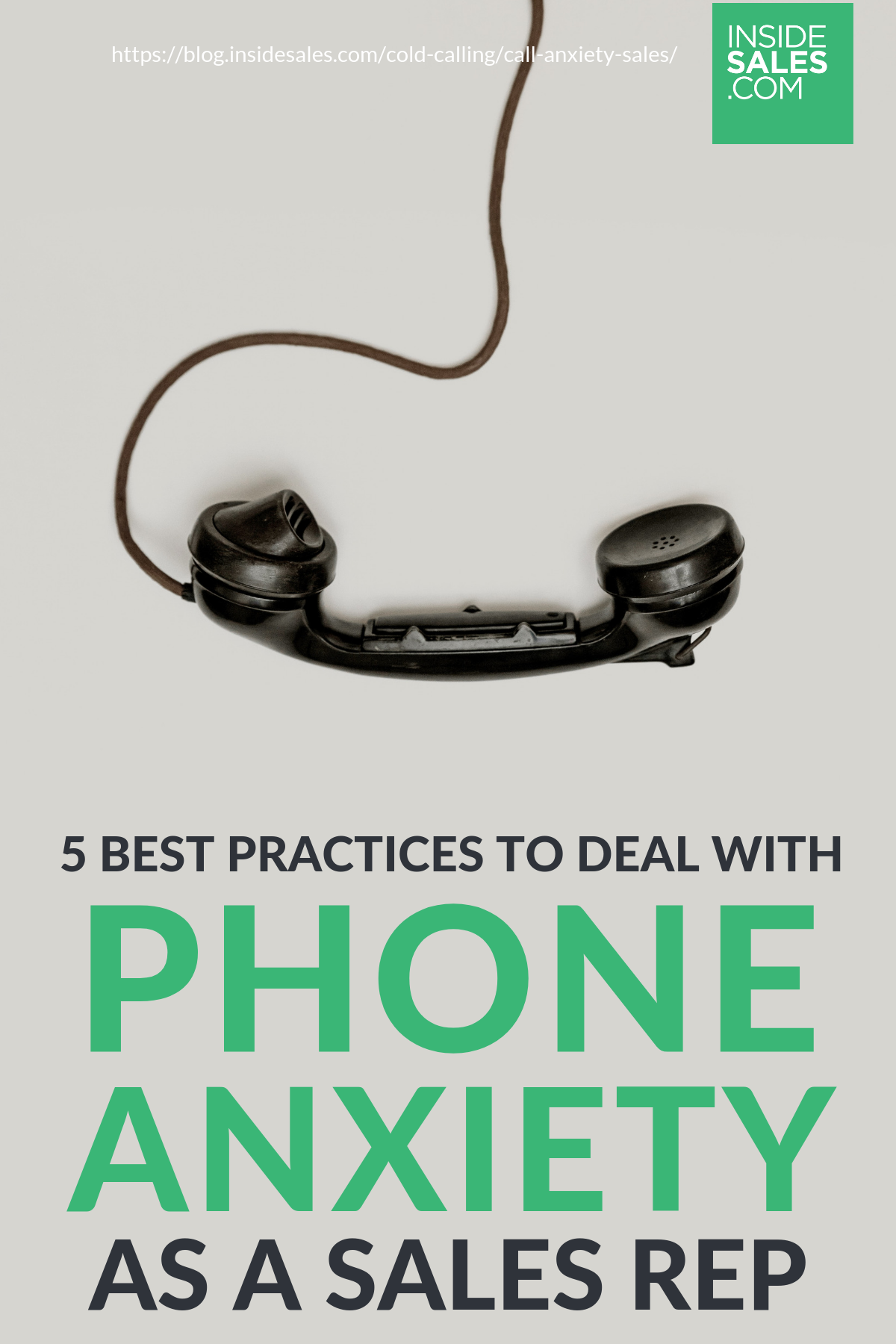5 Best Practices To Deal With Phone Anxiety As A Sales Rep
If you suffer from phone anxiety at work, apply these five helpful practices to work better! Read on to find out more.
RELATED: It’s Not the Calls You Take, But the Calls You Make
In this article:
- Reasons Why People Have Anxiety About Talking on the Phone
- Importance of Phone Calls
- Note: Don’t Be An Order Taker
- Conclusion: Call Anxiety is Not the End-All
How to Get Over Phone Anxiety for Sales Reps
What is Phone Anxiety? A common sales anxiety among salespeople that’s triggered by having to conduct cold calls.
Reasons Why People Have Anxiety About Talking on the Phone
Nowadays, people are more hesitant about using cold calling to connect with prospects. This anxiety about phone calls is affecting the productivity of sales professionals.
Therefore, addressing phone anxiety for sales reps should be one of the first things that they should work on. To be able to overcome phone anxiety, you should first identify what causes it.
After you know the common reasons why people have phone anxiety, then you can better counteract it. With that said, there are the reasons why people are more anxious about talking on the phone with people.
For a society that has a mobile phone with them at all times, it’s quite ironic that a lot of people have telephone phobia. On that note, why do people have phone anxiety in the first place?
According to psychologists, this may be due to several reasons. Here are three of them:
1. You Have a Harder Time Figuring Out What the Person On the Other End is Thinking
One of the reasons why more people have a fear of talking over the phone is they can’t gauge what the person on the other end of the line is thinking.
When you talk to someone face-to-face, you’re receiving information beyond words. You can also observe their body language, facial expressions, and gestures.
Since you can’t see the person you’re talking to on the phone, it’ll be harder for you to read what they’re thinking. In turn, this contributes to the anxiety one may feel about making phone calls.
2. People Don’t Have the Need to Call As Often As Before
Before there was social media, the Internet, or even the cell phone, there was the telephone. It was the most convenient form of communication, so people did it often back in the day.
As technology improved, so did the convenience of talking to people from all over. We went from calls to texts, and then from texting to instant messaging.
Since it’s not often required to call these days, people have become unused to phone calls. Not doing something often causes people to feel uncomfortable when they actually have to do it.
3. There’s an Additional Time Pressure Put On You
Phone calls can be disruptive for people on the other end of the line. With cold calls, there’s an even more significant hurdle to overcome since you’re taking someone’s time and working to convince them you’re worth it.
Thus, it is understandable why there’s more stress on sales professionals when it comes to making phone calls.
Additionally, you also don’t have the luxury of pauses. Sales reps don’t get to pause and think about their response, unlike in face-to-face communication.
This is a big reason why having to talk over the phone with a potential client is more intimidating. However, just because it’s a daunting task to accomplish doesn’t mean you should avoid it altogether.
Importance of Phone Calls
You’d think with the rise of email, texting, messaging, and chat, the phone would have declined in importance. Yet, it’s instead become more valuable than ever for sales teams as a way to immediately connect with prospects and customers.
But what if making calls causes you anxiety? It’s not an uncommon problem in spite of the stereotype of the ‘extroverted’ sales rep.
If you feel anxiety while making phone calls to potential customers, then starting a constructive conversation to possibly close a sale may not happen. Even setting up an appointment can prove to be challenging.
But there are ways to overcome that innate unease.
1. Build Flexibility Into Your Script
People who suffer from anxiety talking on the phone prefer texting instead. That’s because they can think and compose a text message without feeling any pressure to communicate well on the spot.
With that in mind, a script can be prepared to help you jumpstart the conversation.
Scripts are a useful guideline for navigating the conversation between sales reps and prospects. But unless you’ve practiced them until you’re comfortable in your delivery, they can come off as a robotic and detached experience for the person on the other line.
An even better way to utilize a script is to adjust it to your own speaking syntax and patterns while making sure you stay on message.
And of course, customizing to the recipient is important, too!
2. Full Steam Ahead

Making calls to overcome call anxiety
Procrastinating and excuse-making to dodge calling is all too easy to do when you have call anxiety. Yet, putting things off will only make you feel more anxious.
Of course, you need to prepare for your dials. But once you’ve prepped, give yourself the shock treatment of jumping in and doing it.
Once the initial shudder is over, you can fall into the routine – not unlike settling into swimming after leaping into a cold pool.
By plunging straight into the calls, it serves as a kind of exposure therapy for you. The moment you start getting into the groove of making calls, you’ll find that it isn’t as hard as you thought it would be.
3. Curiosity About Your Fellow Humans
Alexa Fischer is an actress, motivational speaker, and career coach. She suggests not worrying about being clever or sounding smart, but to be curious about others.
You’re dealing with people all day and trying to get information from them. This is a useful skill to have, especially since many people enjoy talking about themselves.
To get into the mindset, change your thinking from paranoia about the call to curiosity about what you’ll learn from the person you’re calling. Focusing on what you can learn from the other person may help reduce stress and anxiety.
Rather than be worried about your own performance, you’re focusing on the other person. In doing so, you are engaging in best practices for customer-oriented selling.
You can also become more curious by improving your attention to mindful living. There are excellent, free resources in abundance about mindfulness.
We’ll only note the key point: Mindful living makes you observe the world around you. It is reviving the sense of wonder and inquisitiveness you likely had when you were younger. That same sense carries over to sales calls.
4. Study Your Sales Calls
No professional advice or blog post will be as effective at enhancing your performance as listening to your own calls. Grating though it may be, analyzing your calls and dissecting them for strengths and weaknesses is the single best way to get better.
(Or ‘git gud’ as the millennials say.)
If you’re having trouble doing it on your own, consult someone with more experience, such as your sales manager.
Yes, it’s awkward. Yes, many people hate the sound of their own voice (primarily because the voice in our head is different from what others hear). Some may even become more anxious after hearing their voices.
But as we adapt to hearing our own voices through the simple processes of time and exposure, we become desensitized to the initial discomfort.
We will be able to listen in a detached manner that focuses on spotting highlights, errors, and corrections.
RELATED: The Best Times for Scheduled Sales Calls and Demos
5. Remember, You’re Helping, And Not A Nuisance
Many sales professionals with anxiety around making calls are also empathetic and caring. They know what it’s like to be intruded upon by a telemarketer or salesperson.
This is why they have a tendency to think of themselves as that irritating individual who is interrupting a busy prospect. That type of thinking permeates the atmosphere of the conversation.
The person you’re calling picks up on that negative energy, and it’s all downhill from there.
It’s no surprise at all when they reject you then, is it? They’re just picking up what you’re putting down. But if you shift your thinking from intrusion to assistance, you can change that energy and be more confident in sales calls.
Note: Don’t Be An Order Taker
Remember, buyers want their sales reps to be trusted advisors and bring value – not just order takers. Put yourself in that mindset – you know your offering and how it solves problems for your customers.
You’re not being a pest. You’re helping your prospects alleviate an issue that’s been bothering them far more than you ever think you could.
Framing your thinking to one of helping prospects and customers not only makes for more positive energy, but it also reduces the stress and pressure on you.
While you’re of course trying to qualify or convert them, your primary focus should be one of advising. It’s a much less stressful experience for both you and whoever you’re calling. After all, if your leads reject you, that’s cool – they just opted not to take your advice right now.
Conclusion: Call Anxiety is Not the End-All

Overcoming phone anxiety for great sales
Call anxiety is a common problem, with a variety of logical causes. But there’s also plenty of ways to reduce, and eventually, vanquish that fear entirely. Just follow these guidelines, and you’ll be cheerfully chatting away to customers and prospects, converting and closing with your advisor-first stance.
Don’t let your anxiety attacks over starting phone conversations take away your chance of improving your sales performance. Practice these tips when making phone calls to potential clients for better results. Exposure therapy can help you overcome your fear and bring you the success you want.
It’s not easy to get over phone anxiety, but you can take small steps towards overcoming it. After all, doing so will only help you have better sales performance.
Do you also have phone anxiety when it’s time to call your clients? How did you overcome this? Share your experience in the comments section below.
UP NEXT:
- Overcoming Objections in Sales Calls in 3 Simple Steps
- Cold Calling Secrets: How To Eliminate Fear, Failure, And Rejection
- No More Sci-Fi Talk: 5 Things AI Can Do For Your Business Right Now

Editor’s Note: This post was published on August 10, 2018, and has been updated for quality and relevancy.



